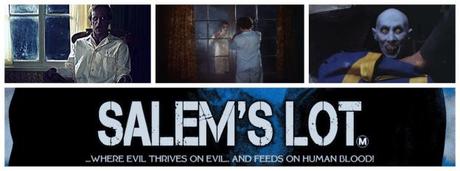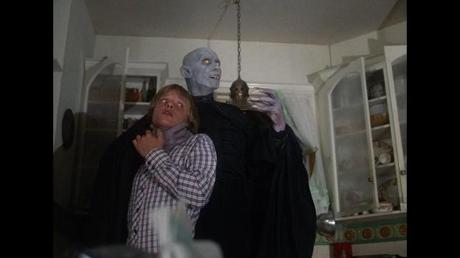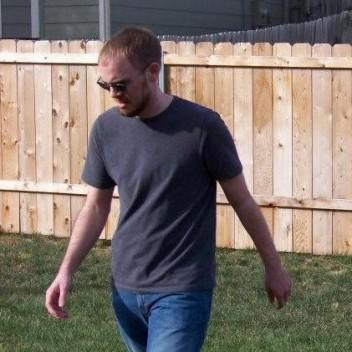With Pet Sematary already here and It: Chapter 2 on the way, I'm starting a weekly series where I make my way through some of my Stephen King blind spots. Last week: Tales from the Darkside: The Movie, a horror anthology which has forever imprinted on my brain the image of Buster Poindexter swallowing an entire black cat. Today, I learn just where the "creepy vampire kid floating outside a second story window" trope comes from.
It's Tobe Hooper's 1979 TV classic Salem's Lot, a mini-series which dares to ask: is it possible to do an Invasion of the Body Snatchers story with vampires instead of aliens? Eh, kind of. But, seriously, get that damn kid away from my window.

Stephen King's first novel, Carrie, was adapted into a feature-length film. His second, Salem's Lot, was wrestled down into a CBS mini-series which skirted on the extreme edges of what the censors would allow.
That feels right somehow. It set the tone for over 40 years of King movies which probably should have been TV shows and TV shows which probably needed an R-Rating to totally work. Carrie, to be clear, rise above all that. It remains a consensus pick for one of the all-time best Stephen King movies. Salem's Lot, however, had it both ways, first aired on TV and then edited into a 112-minute film version released in theaters overseas.
Stephen King has given contradictory statements over whether he prefers the film or the mini-series, but to the immense frustration of hardcore fans Salem's Lot: The Movie used to be the only version you could buy. There is now a 183-minute version on Blu-Ray. That's the one I watched.
It....let me put it this way: I really wish I had seen this when I was a kid. Show the 8-year-old version of me images of undead kids floating outside windows or an oddly blueish, rat-like creature everyone agrees to call a "vampire" and it'd be game over for me with sleeping. Guaranteed nightmare city for at least a week. Watching Salem's Lot for the first time as an adult, however, reveals just how poorly it has aged.
The PlotAfter the tragic death of his wife, novelist Ben Mears (David Soul) is drawn back to his quaint, New England hometown. He befriends some of the locals and begins a romance with a local school teacher (Bonnie Bedelia), but he quickly notices something is not right about the Marsten House - a spooky, Gothic structure which looks down on the entire city from atop a hill. A mysterious antiques dealer named Straker (James Mason) and his perpetually absent, European benefactor Kurt Barlow (Reggie Nalder) have recently bought the house, which is right around the time people in town started disappearing.
Say - crazy theory, I know - but hear me out here: what if Barlow's a Nosferatu-style vampire, Straker his handler, and all the missing people are now creatures of the night?
But that'd be too crazy, right? Vampires? In a Stephen King story? Nope. No way. No sire...

Oh, shit! They're totally vampires! Good luck with that, townspeople. I'm off to Guatemala!
Ok. Mears doesn't run quite that quickly. Instead, he partners with his new girlfriend's father and a teenaged horror film buff to take the stake fight right to Barlow.
On the page, King intended for this - which he began as a short-story to satisfy a college course requirement and then published as a 403-page novel in 1975 - to serve as a commentary on Nixon-era America. "I think the unspeakable obscenity in Salem's Lot has to do with my own disillusionment and consequent fear for the future," King told critic Douglas Winter. "The secret room in Salem's Lot is paranoia, the prevailing spirit of the 1970s. It's a book about vampires; it's also a book about all those silent houses, all those drawn shades, all those people who are no longer what they seem."
The idea is to contrast capital "E" Evil with small-town America evil. King presents an ensemble of average Americans whose immoral actions behind closed doors contrast with their front stage behavior so thoroughly that the notion of them turning into homogenized, animalistic, blood-sucking vampires doesn't seem so far-fetched.
It's King's attempt at an Americanized version of Bram Stoker's Dracula, with Jerusalem's Lot standing in for Transylvania. Years later, King admitted in Danse Macabre the following about his writing process for the novel: " Salem's Lot was the ball and Dracula was the wall I kept hitting it against, watching to see how and where it would bounce so I could hit it again."
Add in an emotionally damaged writer as the protagonist and place everything in a fictional Maine town and you can see how Salem's Lot was King's prototype for many similar stories down the road.
The ProductionWarner Bros. didn't totally know what to do with that, but the guy who wrote Carrie had just written a new vampire book at a time when Hammer Film Productions had capped a run of 7 different Christopher Lee Dracula movies in the UK. Clearly, there was money to be made.
So, the studio bought the Salem's Lot film rights within a year of the book's publication and funneled over a million in development costs to at least four different screenwriters, most famously It's Alive writer-director Larry Cohen. He's the one who had the idea to change the suave, European Barlow from the book into a modern Nosferatu, and it stuck, so much that he later fought - and lost - a WGA arbitration case for credit on the final screenplay.
All that time and money spent and still no solid direction forward. "It was a mess," King told Cinefantastique. "Every director in Hollywood who's ever been involved with horror wanted to do it, but nobody could come up with a script."
George Romero was attached to direct, but once Warner Bros. decided to turn it into a mini-series instead of a feature film he passed. After his departure, Warner Bros. Television hired Paul Monash to write and produce, figuring he knew a thing or two about small-town stories and Stephen King adaptations since he'd created Peyton Place in the 60s and had just finished producing Brian De Palma's Carrie. Monash selected 36-year-old Tobe Hooper to direct based on the strength of The Texas Chain Saw Massacre.
It was "right job, right time" for Hooper, who had just been replaced by his assistant director after only 4 days of shooting on T he Dark (1978). Salem's Lot, however, would prove to be a punishing gig. Hooper estimated that he was doing as many as forty camera set-ups a day for two months straight usually on three hours sleep a night.
My ReviewEven with Hooper's hard work, the subtext and commentary of the novel were lost in translation somewhere. Hooper's Salem's Lot isn't really about the corrosion and hypocrisies of the silent majority; it's a Body Snatchers story with vampires instead of aliens, a murder mystery series where all the victims have been drained of their blood, and a romance about a guy who turns remarkably controlling almost as soon as the relationship begins. More importantly, it's just unbelievably slow-moving.
As Buzzfeed argued in its ranking of all King film and TV adaptations, "Yes, Salem's Lot has scary moments - especially for a late-'70s TV adaptation for CBS - but the miniseries as a whole is pretty damn boring. The pacing is all off: The action doesn't really pick up until a full two hours into its three-hour runtime, and at that point it's hard to care much if the vampires completely take over the town."
To be fair, that's in the source material. King doesn't mention vampires until over 100 pages into his 400-page book, and the mini-series adaptation similarly doesn't present anything explicitly supernatural until well into its second hour. As someone who grew up on the King ABC mini-series adaptations of the 1990s, I'm familiar with this kind of slow-burn approach, and you obviously want to get to know the characters before the proverbial shit hits the fan.
However, there's less quality character work here and more frustration with a story which is constantly challenged to sustain momentum since its best moments are immediately followed by abrupt cuts to black - obvious commercial breaks at the time, awkward stopping points now.
Moreover, presenting Barlow as an animalistic, Max Schreck vampire whose prosthetics never allow him to close his mouth ultimately - and quite severely - limits his screen time thus altering the balance of power in the story. As Romero noted in explaining his distaste for the script, "The biggest problem I had with it was that the vampire wasn't the lord. The vampire was an attack dog for James Mason."
Still, James Mason is having an awful lot of fun with it, and the constant fight with the CBS censors does ensure Salem's Lot sporadic moments of horror stick in the memory more. I can see why this has a nostalgic hold over anyone who saw it as a kid. I also appreciate that it left such a long-lasting impression in Bryan Fuller that he directly cribbed Salem's Lot's memorable antler hanging scene for Hannibal.
That's why I can't really come down too hard on Salem's Lot. It's ultimately a product of its moment with the long hairstyles to show for it. The passage of time has robbed the mini-series of the "I can't believe they got away with that on broadcast TV!" qualities it likely possessed for the average viewer in 1979. However, put Tobe Hooper behind the camera of a Stephen King adaptation and you're sure to get some quality horror moments which play in any era.
One-Sentence PitchIf "Tobe Hooper directs an Americanized Hammer horror movie featuring Stephen King tropes" sounds good to you AND you have the patience for a bit of a plodding story....
The Sequel & RemakeAs mentioned, Larry Cohen made a movie sequel, and then in 2004 TNT aired a new mini-series starring Rob Lowe in a leather jacket and Rutger Hauer as Barlow sans- Nosferatu make-up and prosthetics. This version is surprisingly hard to come by online, legally at least, and I'm not ready to buy it on Amazon. However, Salem's Lot devotees typically regard the 2004 version as a worthwhile companion piece.
Where Does Barlow Rank On the List of Best Stephen King Monsters?Below Pennywise, Randall Flagg, Jack Torrance, and Annie Wilkes, for sure, but I'd also put him below Gage Creed, Greg Stillson, Christine, and Margaret White. He just doesn't do enough in the mini-series to register as much as the others for me.
Any Top 10 All-Time Best Stephen King Movie Moments?That has to be a candidate. Go away, vampire Ralphie (Ronnie Scribner)! You're not invited here! Away, I say.
Sources: Creepshows: The Illustrated Stephen King Movie Guide, Hollywood's Stephen King by Tony Magistrale
What should I watch next: Desperation, Cujo, or The Dead Zone?

Grew up obsessing over movies and TV shows. Worked in a video store. Minored in film at college because my college didn't offer a film major. Worked in academia for a while. Have been freelance writing and running this blog since 2013. View all posts by Kelly Konda

